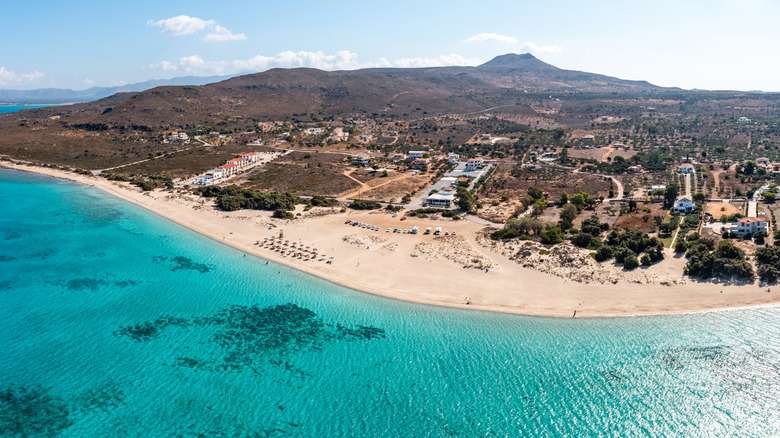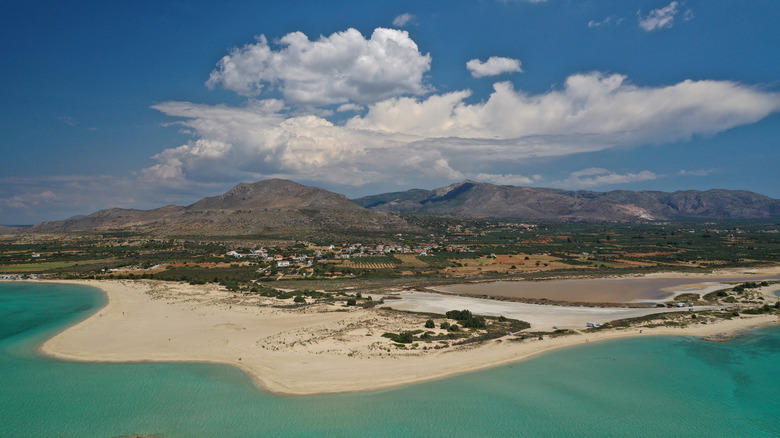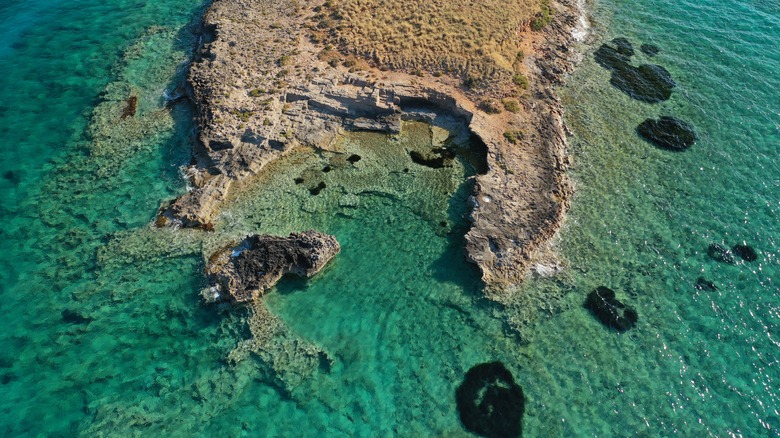This Underrated Greek Island With Pristine Beaches Is An Idyllic Escape From Crowds
Are you dreaming of a vacation on a Greek island? Are there thoughts of incredible history, delicious seafood, and gorgeous beaches drifting through your head? We're with you on that. However, maybe in your dreams, this lovely Greek vacation isn't just spent touring the Parthenon in crowded Athens or the Sanctuary of Apollo at Delphi. While these places have been touted as must-sees since one of the very first travel writers documented them at the beginning of the Common Era, perhaps you've got something quieter in mind for a few days. We have the perfect Greek island for you.
This lovely gem of an island is Elafonissos, and it's exactly what the Greek gods ordered for you. Set right by the Peloponnese and the island of Kythira in the Gulf of Laconia, Elafonissos is a mere seven square miles. You can take a short 10 to 15-minute ferry ride from Neapolis or Pounta to get there. The main village has lovely shops and tavernas, and there are gorgeous beaches to discover. Plus, a nearby underwater island is a UNESCO-protected site and features the ruins of a 5,000-year-old planned city, complete with roads and buildings. Let's visit Elafonissos, its pristine beaches, and the history sitting underwater just a mere 700 meters away.
All about Elafonissos, Greece
Not to be confused with Elafonissi Beach in Crete, Elafonissos Island was once attached to the Peloponnese by a little strip of land that is now underwater. This pretty place is great to visit year-round, with temperatures hitting the high 80s Fahrenheit in the summer, and highs around the mid-50s Fahrenheit in the winter. The spring is the best time for flowers, with the summer as high season for tourists. This is a quiet place, with a village and outdoor activities as opposed to a lot of sightseeing. That said, you can visit the Agios Spyridon, a small church on a little bit of land that you have to walk over a footbridge to get to. There are shops and tavernas in Elafonissos village on the north side, complete with lovely white walls and blue accents. It looks like a postcard. There is evidence that this place has been inhabited since prehistoric times.
Ferry tickets must be purchased at either Neapolis or Pounta, and cannot be purchased online. Visiting this place doesn't really require a car, as small as it is. You can rent a bicycle or a scooter to get around, though your own two feet will work just as well. Hiking is a big activity here, and there is a little folklore museum featuring the history and culture of the island.
Beaches and underwater history
The beaches are the big draw on Elafonissos. The popular Simos Beach features a long stretch of golden sand and is split into two sections: Megalos is the larger side, and Mikros is the smaller one. Just so you know, there is some nude bathing on Mikros Simos beach. There are also chairs and umbrellas here and nearby food places. Pouda Beach is even quieter, and if you visit in the summer during tourist season, this is likely your best bet. Snorkeling and scuba are big on this island with incredibly clear water, and when it's windy, you can try out some windsurfing.
Just 700 meters off the northeast coast, you can snorkel the ruins of Pavlopetri (also called Paulopetri), the oldest underwater city on the planet. This place was inhabited five millennia ago and may even have been one possible inspiration for Atlantis. Rediscovered in 1967 with aerial photography, there are streets and buildings here. It's still being excavated, and scuba is prohibited. Snorkeling is allowed, but please respect the age and significance of this spot.
While you're here, seafood is a must, particularly the octopus stifado or stew. The local wine and raki are popular. If you aren't familiar with raki (ρακή), it's sort of a grape brandy consumed in the area that contains around 30 to 40% alcohol. It's sort of a cloudy liquid made from the residue of the autumn grapes, and is similar to Italian grappa.


